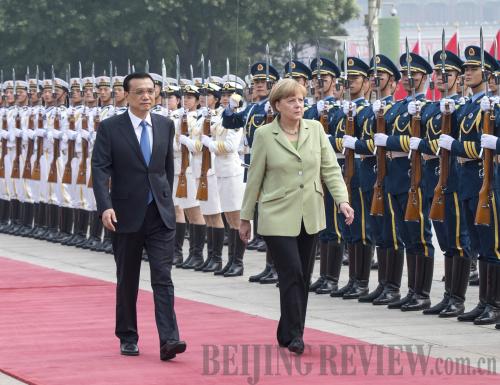|
 |
|
MEETING AN OLD FRIEND: Chinese Premier Li Keqiang holds a welcoming ceremony for German Chancellor Angela Merkel in Beijing on July 7 (PANG XINLEI) |
German Chancellor Angela Merkel deserves to be called an old friend of the Chinese people after wrapping up on July 8 her seventh visit to China since first assuming Germany's top administrative post in 2005.
Instead of Beijing, Chengdu, capital of southwest China's Sichuan Province, became the first stop of Merkel's latest three-day visit. Snatching a little leisure time from a busy trip during her stay, Merkel visited a market and learned to make the region's famous Kung Pao Chicken dish from a local chef.
Aside from the culinary experience, Merkel focused on furthering the rapid development of bilateral economic relations between the two countries.
Exploring China's west
In interviews with Chinese media, German Ambassador to China Michael Clauss confirmed that Merkel personally chose Chengdu as the first stop of her visit.
The German chancellor's decision indicates the strong interest of Germany and its various enterprises in finding investment opportunities in China's central and western regions, according to Cui Hongjian, Director of the Department for European Studies at the China Institute of International Studies.
Sichuan is home to 80 million people, nearly equaling the population of Germany. With China's large-scale urbanization, local cities, big and small, are busy upgrading municipal infrastructure including waste disposal systems, water and power supply facilities, canals and roads, as well as technology and financial services. Thus, many German financial institutions have shown great interest in the region. During her visit, Merkel was accompanied by several heavyweight bankers including a top executive of Deutsche Bank.
Germany has become a major source of investment in Sichuan. Chengdu, in particular, is now seen as an important springboard for German enterprises to explore the relatively underdeveloped western part of China.
Currently, there are about 160 German companies active in Chengdu. Since 2011, the renowned German industrial giant Bosch Group has made a large investment in the city in developing control systems for automobile chassis and electrical devices. Last year, Siemens launched a research and development base in Chengdu to develop industrial automation products, the first digital enterprise the company has established outside of Germany.
In Chengdu, Merkel attended a forum on cooperation in urbanization between Sichuan and Germany. She also toured a factory operated by German car manufacturer Volkswagen, which produces the two popular models Jetta and Passat in its Chengdu factory. The German auto giant is also eyeing China's electric car market. In her following trip in Beijing, Merkel attended a ceremony to launch the Sino-German Electric Vehicle Charging Project at Tsinghua University, an important step in helping German carmakers to stay one step ahead in China's electric car market.
Besides Merkel, the huge development potential of China's western region has attracted a lot of other foreign leaders to come and have a closer look. Last year, British Prime Minister David Cameron paid a visit to Chengdu during his trip to China. U.S. Vice President Joe Biden made a stop in the city in 2011. Canadian Prime Minister Stephen Harper visited southwest China's Chongqing Municipality in 2012. South Korean President Park Geun Hye visited Xi'an, capital of northwest China's Shaanxi Province, where she inspected South Korean electronic industry giant Samsung's large investment project in the city.
Sustainable partnership
German observers have noted that China-Germany relations have seen a "golden decade," but few have claimed to be able to foresee the future of bilateral relations between the two.
In response, Merkel's latest China visit has sent a positive message that China and Germany will enjoy a sustainable partnership.
| 